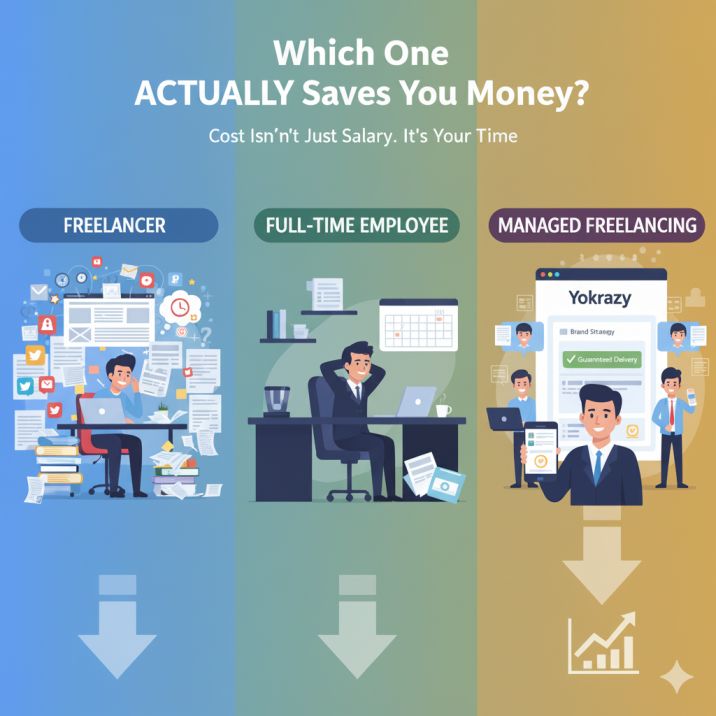Freelancer vs. full-time employee vs. managed freelancing: which one can save you money?
When your business requires work, be it a website design, an app, social media running, a CRM, or the day-to-day operations, you have the same big question:
Is it a full-time worker, a freelancer, or a managed freelancing provider that I should use?
At face value, the solution is easy. Freelancers look cheaper. Full-time workers are more reliable. Managed freelancing is a popular term, but is it worth it? However, there is seldom reality as it seems. You know, when you have ever employed a freelancer and done half of the follow-up by yourself. When you have employed a full-time employee and felt that you do not have enough work to keep him or her occupied, then you have the frustration. You know it when you have had to balance deadlines, lack of communication, and quality issues.
Now, let us get this dissected and talk right to you of what you are passing through.
1. Cost Isn’t Just Salary or Project Fees
People often compare like this:
-
Freelancer cost = project-based
-
Full-time employee cost = salary-based
But that is incomplete.
There are hidden costs that matter more.
| Component | Cost Impact |
|---|---|
| Salary | Fixed monthly expense, whether work is there or not |
| Employee Benefits (PF, Paid Leaves, etc.) | Mandatory overhead |
| Tools & Workspace | Laptops, software access, office space |
| Upskilling | You pay to train them |
| Notice Period/Attrition Risk | Replacement cost & downtime |
Even if the employee is underutilised for half the month, you still pay the same.
Freelancer Costs:
| Component | Cost Impact |
|---|---|
| Project fee | Seems affordable upfront |
| Quality variation | If rework is needed, it costs more |
| Time spent managing them | Your time = actual cost |
| Replacement if they disappear | Restarting work delays goals |
Freelancers might appear cheaper.
The cost of time spent in coordinating is a direct cost.
When you are spending 10-15 hours a week explaining, reviewing, reminding, and following up, it adds up to 40-60 hours a month wasted.
Assuming that your time is worth ₹2,000/hour, then that is ₹80,000 - ₹120,000/month in hidden costs.
Before you did not count that, did you?
2. Time Cost: The Costliest Ignored Cost.
Ask yourself honestly:
How many times have you:
-
Re-explained the same task to a freelancer?
-
Waited for their reply or follow-up?
-
Chased them because the deadline passed?
-
Realised you are managing the manager?
When you hire freelancers, you become the project manager by default.
And if your business is scaling, your time should be spent on:
-
Strategy
-
Sales
-
Partnerships
-
Product
-
Growth
Not chasing updates.
3. Accountability: The Real Divider
| Model | Who is Accountable for Timely Delivery and Quality? |
|---|---|
| Freelancer | You. They work task by task. |
| Full-Time Employee | You. You monitor performance daily. |
| Managed Freelancing | The service provider. They handle everything end-to-end. |
This is where managed freelancing changes the entire equation.
4. So, What Is Managed Freelancing?
Managed freelancing means:
You still get the flexibility and specialized skill of a freelancer. But you don’t manage the freelancer.
You have a single point of contact who handles:
-
Task assignments
-
Quality control
-
Timelines
-
Revisions
-
Communication
-
Backup resources if someone is unavailable
-
Reporting and performance tracking
You get work done. Without managing the work.
This is exactly what platforms like Yokrazy are built for. You simply say what needs to be done
and the delivery is managed for you.
5. Cost Comparison: Real Numbers
Let’s take an example:
Scenario: You need ongoing design + social media + website maintenance.
| Model | Approx. Monthly Cost | Actual Work Delivery | Your Time Involved | Risk |
|---|---|---|---|---|
| Full-Time Employee | ₹45,000 – ₹120,000/month | Limited skill set | High | Medium |
| Freelancer(s) | ₹10,000 – ₹80,000/month | Depends on quality | Very High | Very High |
| Managed Freelancing (via Yokrazy) | ₹18,000 – ₹60,000/month | Guaranteed delivery with quality | Low | Low |
So who actually saves you money?
The one that saves your time and delivers consistent work with no hand-holding.
6. But What About Control?
This is a common concern.
You may think: "With freelancers, I control everything." But control without structure leads to chaos. Managed freelancing gives you:
-
Transparent reports
-
Single communication channel
-
Milestone-based delivery
-
Defined timelines
-
Clear accountability
So you actually gain more control with less involvement.
7. When Each Model Makes Sense
| Situation | Best Model | Why |
|---|---|---|
| You have constant workload and need deep role involvement | Full-Time Employee | Stability |
| You have one-time or very small tasks | Freelancer | Cost-efficient |
| You need consistent output without managing people | Managed Freelancing | Best mix of cost + quality + accountability |
8. The Real Question Isn’t Cost
It’s simpler than that:
How much is your time worth?
If your business grows faster when you are not stuck managing people, then the most cost-effective model is the one that frees you. That’s managed freelancing.
You don’t just need work executed.
You need work completed correctly, consistently, and without stress.
So ask yourself:
Do you want to keep chasing freelancers and employees?
Or do you want work delivered smoothly while you focus on scaling your business?
If you’re choosing ease, quality, and ROI: Managed freelancing is the clear winner.

